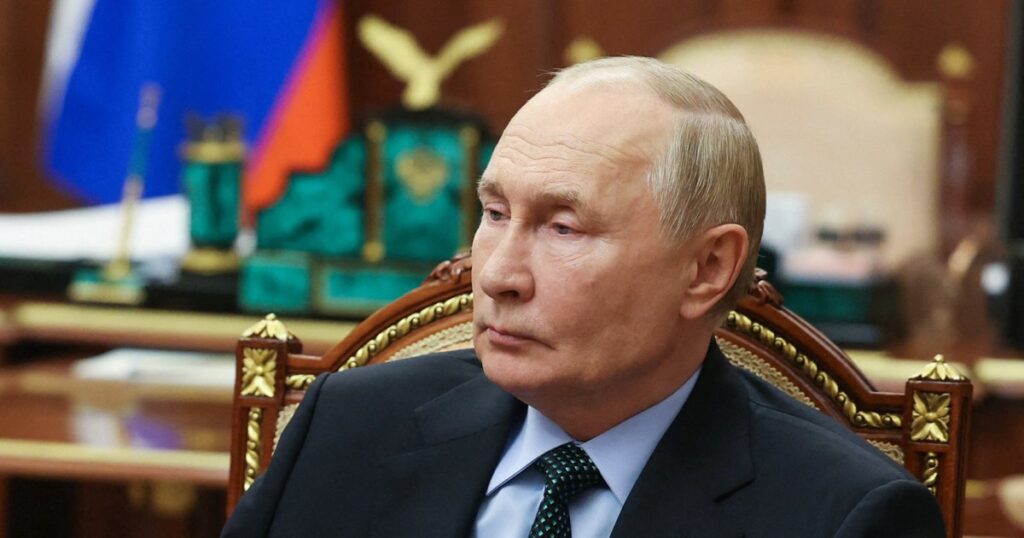Russian President Vladimir Putin on Tuesday formally lowered the threshold for using his country’s nuclear weapons, days after the United States authorized Ukraine to attack Russian territory with American missiles.
The Kremlin announced that President Putin has approved the latest nuclear doctrine, the document that governs how Russia uses nuclear weapons. It includes a declaration that Russia could launch a nuclear attack if attacked by a non-nuclear state supported by a nuclear state. .
Russia’s Ministry of Defense announced late Tuesday that Ukraine had carried out its first attack on Russian territory using long-range weapons provided by the United States, hitting military facilities in the Bryansk region with ATACMS missiles.
Russian air defense forces shot down five ATACMS missiles, but debris from another “fell into the technical area of a military installation in the Bryansk region, causing a fire, which was quickly extinguished.” Casualties and injuries. There was no damage,” the statement said.
“According to confirmed data, the deployed ATACMS operational tactical missile was of American origin,” the statement said.
Later, two U.S. officials confirmed to NBC News that Ukraine fired an ATACMS near the city of Karachev in the Bryansk region across the northern border, marking the first time a U.S.-supplied weapon had been used on Russian soil.
They said Ukraine had already struck targets deep in Russia, but with homemade drones rather than Western missiles with the firepower of ATACMs.
The Ukrainian military announced that it had attacked a munitions factory near the city of Karachev in the Bryansk region. It did not say what kind of weapon was used in the attack.
The change in Russia’s nuclear doctrine marks the most significant tremor of the sword yet by the Kremlin, which has consistently warned of the possibility of nuclear war in the 1,000 days since its all-out invasion of Ukraine.
“Updating the nuclear principles was necessary to bring the document into line with the current political situation,” Kremlin spokesman Dmitry Peskov told the state news agency TASS in comments published early Tuesday.
Peskov outlined new threats from Russia in light of Washington’s policy shift, under new doctrine that could lead to a nuclear response if Ukraine’s military uses Western non-nuclear missiles against Russia. said.
Still, he added, the use of nuclear weapons would be a “last resort.”
President Putin signaled an update to his country’s policy earlier this year as he sought to warn Western countries against relaxing restrictions on Kiev’s use of long-range weapons to strike deep into Russia.
He also said Russia had reserved the use of weapons even if Belarus was attacked. And new doctrine coincides with that change.
“Aggression against the Russian Federation and its allies by non-nuclear states with the support of nuclear-weapon states shall be considered a joint attack.”
The principle also states that “the Russian Federation may use nuclear weapons in the event of a serious threat to the sovereignty and territorial integrity of itself and Belarus” and that “the very existence of the Russian Federation In the event of danger, nuclear weapons may be used.” This has been changed from the previous wording. The nation is at risk. ”
The change comes after President Putin warned the United States and its NATO allies that using long-range weapons supplied to Ukraine against Russian territory would mean NATO and Russia were at war. It is what I received.
The Biden administration has long resisted demands from Kiev to ease restrictions on weapons it supplies to allies.
However, after the United States and other countries announced that thousands of North Korean troops had joined the fighting alongside Kremlin forces, U.S. officials told NBC News that the Biden administration plans to carry out limited attacks inside Russia. He said he had authorized the use of the long-range ATACMS missile system.
The change drew condemnation from the Kremlin, with Peskov saying on Monday that the US was adding “fuel to the fire” and causing “further escalation of tensions around this conflict.”
Tatyana Stanovaya, a nonresident scholar and founder and director of the Carnegie Endowment for International Peace, said the change would be a “response to Russia’s response to attacks on Russian territory by Ukraine, or in the Kremlin framework, by Western countries.” “This will give us more leeway in our nuclear response.” Political analysis company R.Politik.
She pointed to a change in leadership in Washington as a possible motivation behind the timing of the updated nuclear doctrine.
“President Putin may view the current situation as a strategic ‘intermediate’ moment, emphasizing what he sees as the ‘irresponsibility’ of Biden’s policies, while also addressing Trump’s (President-elect) peace efforts. President Putin may try to present Western countries with two stark choices: “Do we want nuclear war?” You will get it,” or “Let’s end this war on Russia’s terms,” Stanovaya said in a post to X.
“This represents a very dangerous crossroads,” she added.



